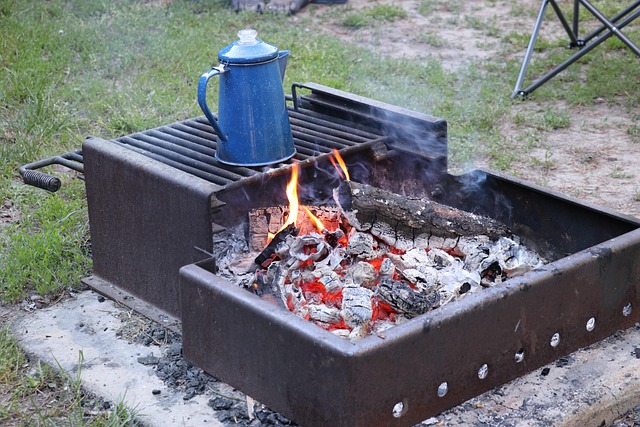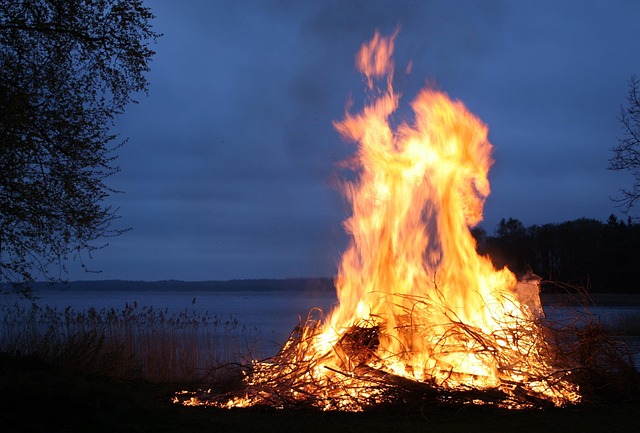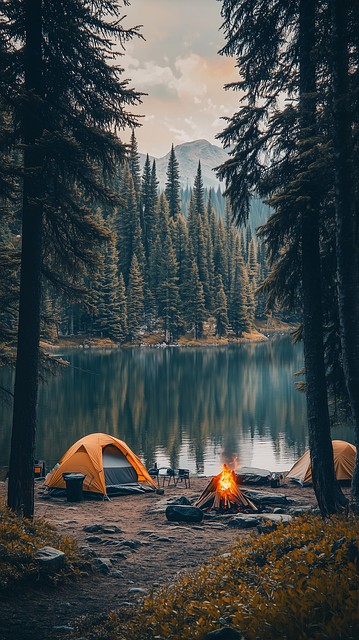
Category: Camping Sites in Lane County Oregon
Camping Sites in Lane County Oregon: An In-Depth Exploration
Introduction
In the heart of the Pacific Northwest, Lane County, Oregon, stands out as a haven for outdoor enthusiasts seeking breathtaking landscapes and authentic wilderness experiences. At the forefront of this allure are its diverse and flourishing camping sites, offering a gateway to the region’s natural wonders. This article embarks on a comprehensive journey through the world of Lane County’s camping sites, uncovering their significance, evolution, and impact on both locals and visitors alike. By delving into various aspects, from historical roots to modern innovations, we aim to provide an insightful guide for anyone considering an outdoor adventure in this picturesque county.
Understanding Camping Sites in Lane County Oregon: A Definition and Historical Overview
Camping sites in Lane County Oregon encompass a network of designated areas and facilities tailored for outdoor recreation and accommodation. These sites range from primitive backcountry camps to modern RV parks, each offering unique experiences that cater to diverse preferences. Historically, camping has been an integral part of human interaction with nature, serving as a means of travel, exploration, and connection with the wilderness.
In Lane County, the tradition of camping dates back centuries, with indigenous tribes utilizing these lands for sustenance, trade, and cultural practices. As European settlers arrived, they adopted and adapted these practices, leading to the development of organized camping sites. Over time, as tourism grew, so did the demand for accessible and well-equipped camping facilities. This evolution has transformed Lane County into a premier destination for outdoor recreation, attracting visitors from around the globe.
Global Impact and Trends: A World-Wide Appeal
The concept of camping sites in Lane County Oregon extends far beyond local borders, captivating international interest due to several key factors. Firstly, the county’s natural beauty, characterized by lush forests, majestic mountains, and pristine waterways, creates a captivating backdrop for outdoor enthusiasts worldwide. Its proximity to major metropolitan areas like Portland also makes it an easily accessible retreat for city dwellers seeking a break from urban life.
Globally, there is a growing trend towards ecotourism, with many travelers prioritizing sustainable and immersive experiences in nature. Lane County’s camping sites align perfectly with this trend, offering opportunities for conservation, education, and cultural exchange. International visitors are drawn to the chance to immerse themselves in the region’s rich ecological diversity and indigenous heritage.
Regional trends reveal a surge in interest from Asian and European countries, where outdoor recreation is gaining popularity as a family activity and a means of stress relief. This influx has led to increased demand for well-managed camping sites that cater to diverse needs, resulting in improved facilities and services across the county.
Economic Considerations: A Vital Component of the Local Economy
Camping sites play a pivotal role in Lane County’s economy, contributing significantly to its tourism sector. According to recent studies, outdoor recreation enthusiasts spend an average of $19 billion annually on camping-related activities in the United States, with Oregon ranking among the top states for per-capita spending. This economic impact is particularly noticeable during peak seasons when sites can be booked months in advance.
The county’s camping industry supports a diverse range of businesses, from local equipment retailers and outdoor gear manufacturers to restaurants, grocery stores, and souvenir shops. Many small enterprises have emerged as a result, offering unique services like guided hikes, river trips, and wilderness workshops. These entrepreneurial ventures not only enhance the visitor experience but also contribute to the overall economic resilience of the region.
Furthermore, camping sites attract local residents who invest in recreational vehicles (RVs) and camping equipment, stimulating the local retail market. The demand for site maintenance, hospitality services, and seasonal labor also creates numerous employment opportunities, fostering a thriving local economy.
Technological Advancements: Enhancing the Camping Experience
Technology has revolutionized the way people access and interact with camping sites in Lane County Oregon, leading to several notable advancements:
-
Online Reservations: Campers can now secure their preferred site through user-friendly booking systems on popular camping apps and websites. This technology allows for better management of site availability and reduces the time spent searching for suitable accommodations.
-
Digital Mapping and Navigation: Advanced GPS services and interactive maps provide real-time directions to camping sites, enhancing accessibility. These tools also offer valuable insights into nearby attractions, facilities, and local events, enriching pre and post-camping experiences.
-
Smart Camping Equipment: The introduction of innovative camping gear, such as solar-powered lighting, portable charging stations, and high-tech cooking appliances, has elevated the comfort and efficiency of outdoor adventures. These devices cater to tech-savvy campers who seek modern conveniences in nature.
-
Social Media Engagement: Camping sites actively utilize social media platforms to promote their facilities, share tips, and engage with customers. This strategy has led to increased visibility, improved customer service, and the creation of online communities for outdoor enthusiasts.
Policy and Regulation: Balancing Conservation and Development
The development and management of camping sites in Lane County Oregon are governed by a comprehensive set of policies and regulations designed to protect the environment while fostering economic growth. These guidelines encompass land-use planning, environmental impact assessments, waste management, and resource conservation.
Local authorities collaborate with state and federal agencies to ensure compliance with regulations such as the Oregon Land Use Planning and Zoning Act and the Clean Water Act. Permitting processes for new camping facilities involve extensive reviews to minimize ecological disruptions and preserve the county’s natural heritage.
One notable policy is the Lane County Camping Management Plan, which outlines strategies for sustainable site development, maintenance, and visitor management. This plan emphasizes the importance of preserving cultural and historical sites, managing wildlife habitats, and promoting responsible recreational use. By adhering to these policies, Lane County ensures that camping experiences remain enjoyable and safe while safeguarding the region’s delicate ecosystem.
Challenges and Criticisms: Addressing Sustained Growth
Despite its immense popularity and economic benefits, the camping industry in Lane County Oregon faces several challenges and criticisms:
-
Overcrowding: During peak seasons, popular camping sites can become overcrowded, leading to limited availability and potential conflicts among campers. This issue has prompted calls for better site planning and allocation of resources to accommodate growing demand.
-
Environmental Concerns: As the number of visitors increases, so does the strain on natural resources. Issues like water scarcity, trash management, and habitat degradation have sparked debates about sustainable practices and responsible tourism. Implementing measures to minimize environmental impact, such as waste recycling programs and water conservation initiatives, is a priority for local authorities.
-
Accessibility and Affordability: Critics argue that camping sites should be more accessible and affordable for all income levels. The cost of camping equipment and site fees can be a barrier for low-income families, limiting their participation in outdoor activities. Efforts to provide subsidized sites and promote community camping initiatives are ongoing to address this concern.
-
Cultural Sensitivity: Preserving cultural heritage sites and respecting indigenous traditions is a critical aspect of responsible tourism. However, some campers have been criticized for disrespectful behavior, including littering sacred sites and disturbing wildlife habitats. Education programs and awareness campaigns are essential to fostering a culture of stewardship among visitors.
Actionable Solutions:
- Implement dynamic pricing strategies to distribute traffic during peak and off-peak seasons.
- Invest in sustainable infrastructure, such as solar-powered facilities and greywater recycling systems.
- Develop community partnerships to organize affordable camping programs and workshops.
- Enhance visitor education on cultural sensitivity, environmental ethics, and responsible recreation.
Case Studies: Exemplary Camping Sites in Action
1. Whittaker Ponds Campground
Located in the heart of Willamette National Forest, Whittaker Ponds is a prime example of a successful camping site that balances natural beauty with modern amenities. This facility offers well-maintained tent and RV sites surrounded by old-growth forests and crystal-clear lakes. The site’s popularity stems from its proximity to hiking trails, fishing spots, and picnicking areas.
Key Success Factors:
- Sustainable Design: Whittaker Ponds incorporates eco-friendly practices, including compost toilets and a recycling program, minimizing its environmental footprint.
- Community Engagement: Local volunteer groups regularly participate in site maintenance, creating a sense of stewardship among campers.
- Educational Programs: The campground hosts nature walks, bird-watching sessions, and workshops on outdoor skills, enriching the visitor experience.
2. Rogue River Campground
Nestled along the scenic Rogue River, this campground offers a unique blend of wilderness camping and river-based activities. Visitors can choose from primitive tent sites or more equipped RV spots, all with easy access to world-class rafting, fishing, and hiking trails.
Lessons Learned:
- Diverse Accommodation Options: Providing alternatives for different preferences ensures a broader customer base and extended season lengths.
- River-Based Attractions: Camping grounds located near rivers or other natural attractions can attract a diverse range of visitors, including families and adventure seekers.
- Partnerships with Local Businesses: Rogue River Campground partners with nearby rafting companies and outdoor gear stores, offering package deals and enhancing the overall visitor experience.
3. Suisun Valley RV Park
Suisun Valley is a prime example of an inclusive camping site that caters to diverse demographics. This RV park offers full-hookup sites for long-term stays, as well as daily rentals for travelers. Its location near wine regions and coastal attractions makes it a popular stopover point for winter travelers.
Best Practices:
- Flexible Stay Options: Accommodating various stay durations attracts a wider range of campers, from weekend warriors to full-time RVers.
- Community Amenities: Suisun Valley provides on-site amenities like laundry facilities, a community kitchen, and organized social events, fostering a sense of community among residents.
- Location Strategy: Proximity to scenic attractions encourages longer stays and repeat visits.
Future Prospects: A Glimpse into the Next Chapter
As Lane County Oregon continues to thrive as a destination for outdoor enthusiasts, several emerging trends and growth areas are shaping its camping industry:
-
Sustainable Tourism: The focus on eco-friendly practices will intensify, with sites adopting renewable energy sources, water conservation technologies, and waste reduction strategies. Education programs targeting campers on sustainable behaviors will become more prevalent.
-
Technologically Enhanced Experiences: Virtual reality (VR) and augmented reality (AR) technologies may be incorporated into camping experiences, offering interactive nature tours and immersive educational content. Improved connectivity through 5G networks could enable real-time remote work opportunities for campers.
-
Niche Camping Experiences: There will be a growing demand for specialized sites catering to niche interests, such as stargazing camps, wildlife observation grounds, or off-grid adventure retreats. These unique offerings appeal to specific demographics and enhance the overall camping experience.
-
Collaborative Camping Initiatives: Public-private partnerships will play a more significant role in developing and managing camping facilities, allowing for cost-effective improvements and expanded access. Community-owned camping sites and cooperative management models are potential areas of growth.
Conclusion: A Journey Towards Sustainable Outdoor Recreation
Camping sites in Lane County Oregon represent more than just places to sleep; they are gateways to exploration, relaxation, and cultural exchange. Through a blend of historical significance, natural beauty, and modern innovations, these sites have become integral to the county’s identity and economy. As the industry evolves, a delicate balance must be maintained between accommodating growing demand and preserving the environment for future generations.
By embracing technological advancements, sustainable practices, and diverse offerings, Lane County’s camping sites are poised to remain at the forefront of outdoor recreation globally. The future looks bright, with opportunities for enhanced visitor experiences, economic growth, and environmental stewardship. As travelers continue to seek authentic connections with nature, these camping grounds will serve as testaments to the enduring allure of the great outdoors.
FAQ Section
Q: Are there any pet-friendly camping sites in Lane County?
A: Yes, many camping sites in Lane County welcome pets, but specific policies vary. Some sites require leashes at all times and may have designated pet areas. It’s essential to check individual site rules before planning your trip.
Q: Can I book camping sites months in advance?
A: Absolutely! Popular camping sites, especially during peak season (summer), fill up quickly. Online booking systems allow for early reservations, ensuring your preferred site and dates.
Q: What are the best spots for stargazing in the county?
A: The remote areas of Lane County, away from city lights, offer some of the best stargazing opportunities. Sites like McKenzie River and Mount Washington have minimal light pollution, providing clear views of the night sky.
Q: Are there any camping sites suitable for large groups or family reunions?
A: Certainly! Lane County has several campgrounds designed to accommodate larger groups with multiple sites or spacious facilities. Contacting local parks and recreation departments can help you find options tailored to your group’s needs.
Q: Can I rent equipment at the camping sites?
A: Some camping sites offer basic rental equipment, such as tents, cots, and camp chairs. However, for specialized gear like kayaks or mountain bikes, nearby outdoor gear stores and rental facilities are recommended.









